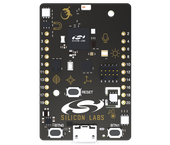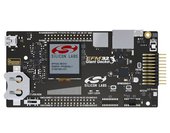Mbed OS Device Management example for various Silicon Labs boards.
DEPRECATED
This example application is not maintained and not recommended. It uses an old version of Mbed OS, Pelion DM, and Arm toolchain. It doesn't work with Mbed Studio.
Please use: https://os.mbed.com/teams/mbed-os-examples/code/mbed-os-example-pelion/
This example is known to work great on the following platforms:
- Thunderboard Sense 2 - on-chip 15.4 Thread and onboard SPI flash. Board specific example using onboard sensors is available here.
- EFM32 Giant Gecko 11 - onboard Ethernet and onboard QSPI flash.
Follow the Quick-Start instructions: https://cloud.mbed.com/quick-start


Example functionality
This example showcases the following device functionality:
- On user button click, increment Pelion LWM2M button resource.
- Allow the user to change the state of the board LED from Pelion LWM2M led_state resource and PUT request.
Use this example with Mbed CLI
1. Import the application into your desktop:
mbed import https://os.mbed.com/teams/SiliconLabs/code/pelion-example-common cd pelion-example-common
2. Install the CLOUD_SDK_API_KEY
mbed config -G CLOUD_SDK_API_KEY <PELION_DM_API_KEY>
For instructions on how to generate your API key, please see the documentation.
3. Initialize firmware credentials (done once per repository). You can use the following command:
mbed dm init -d "<your company name in Pelion DM>" --model-name "<product model identifier>" -q --force
If above command do not work for your Mbed CLI, please consider upgrading Mbed CLI to version 1.8.x or above.
4. Compile and program:
mbed compile -t <toolchain> -m <TARGET_BOARD>
(supported toolchains : GCC_ARM / ARM / IAR)
Revision 5:1456ec2e8485, committed 2019-03-27
- Comitter:
- screamer
- Date:
- Wed Mar 27 19:02:10 2019 +0000
- Parent:
- 4:97dc5666359a
- Commit message:
- Improve inline documentation
Changed in this revision
diff -r 97dc5666359a -r 1456ec2e8485 .gitignore --- /dev/null Thu Jan 01 00:00:00 1970 +0000 +++ b/.gitignore Wed Mar 27 19:02:10 2019 +0000 @@ -0,0 +1,9 @@ +BUILD/ +*.pyc +.DS_Store +.env +.cache/ +.pytest_cache/ +.update-certificates/ +.manifest_tool.json +.mbed_cloud_config.json
diff -r 97dc5666359a -r 1456ec2e8485 .hgignore --- /dev/null Thu Jan 01 00:00:00 1970 +0000 +++ b/.hgignore Wed Mar 27 19:02:10 2019 +0000 @@ -0,0 +1,10 @@ +syntax: glob +BUILD/ +*.pyc +.DS_Store +.env +.cache/ +.pytest_cache/ +.update-certificates/ +.manifest_tool.json +.mbed_cloud_config.json
diff -r 97dc5666359a -r 1456ec2e8485 main.cpp
--- a/main.cpp Thu Mar 21 23:27:40 2019 +0000
+++ b/main.cpp Wed Mar 27 19:02:10 2019 +0000
@@ -21,7 +21,6 @@
#include "simple-mbed-cloud-client.h"
#include "FATFileSystem.h"
#include "LittleFileSystem.h"
-//#include "EFM32_CapSenseSlider.h"
// Default network interface object. Don't forget to change the WiFi SSID/password in mbed_app.json if you're using WiFi.
NetworkInterface *net = NetworkInterface::get_default_instance();
@@ -37,33 +36,30 @@
LittleFileSystem fs("fs");
#endif
-#if USE_BUTTON == 1
+// Default User button for GET example
InterruptIn button(BUTTON1);
-#endif /* USE_BUTTON */
-
// Default LED to use for PUT/POST example
-DigitalOut led(LED1);
-
-// Silicon Labs capacitive touch slider
-// silabs::EFM32_CapSenseSlider capSlider;
+DigitalOut led(LED1, 0);
// Declaring pointers for access to Pelion Device Management Client resources outside of main()
-MbedCloudClientResource *button_res;
-MbedCloudClientResource *led_res;
-MbedCloudClientResource *post_res;
-// MbedCloudClientResource *slider_res;
+MbedCloudClientResource *res_button;
+MbedCloudClientResource *res_led;
+MbedCloudClientResource *res_post;
// An event queue is a very useful structure to debounce information between contexts (e.g. ISR and normal threads)
// This is great because things such as network operations are illegal in ISR, so updating a resource in a button's fall() function is not allowed
EventQueue eventQueue;
+// When the device is registered, this variable will be used to access various useful information, like device ID etc.
+static const ConnectorClientEndpointInfo* endpointInfo;
+
/**
* PUT handler - sets the value of the built-in LED
* @param resource The resource that triggered the callback
* @param newValue Updated value for the resource
*/
void put_callback(MbedCloudClientResource *resource, m2m::String newValue) {
- printf("PUT received. New value: %s\n", newValue.c_str());
+ printf("*** PUT received, new value: %s \n", newValue.c_str());
led = atoi(newValue.c_str());
}
@@ -75,7 +71,7 @@
* @param size Size of the body
*/
void post_callback(MbedCloudClientResource *resource, const uint8_t *buffer, uint16_t size) {
- printf("POST received (length %u). Payload: ", size);
+ printf("*** POST received (length %u). Payload: ", size);
for (size_t ix = 0; ix < size; ix++) {
printf("%02x ", buffer[ix]);
}
@@ -87,36 +83,18 @@
* This function will be triggered either by a physical button press or by a ticker every 5 seconds (see below)
*/
void button_press() {
- int v = button_res->get_value_int() + 1;
- button_res->set_value(v);
- printf("Button clicked %d times\n", v);
+ int v = res_button->get_value_int() + 1;
+ res_button->set_value(v);
+ printf("*** Button clicked %d times \n", v);
}
/**
- * Callback for touching/untouching the capacitive touch slider
- */
-// void touchCallback(void) {
- // if (capSlider.isTouched()) {
- // segmentDisplay.Write("Touch");
- // } else {
- // segmentDisplay.Write("Untouch");
- // }
-// }
-
-/**
- * Callback for sliding the cap slider
- */
-// void slideCallback(void) {
- // printf("Slider notification, status %d\n", capSlider.get_position());
-// }
-
-/**
* Notification callback handler
* @param resource The resource that triggered the callback
* @param status The delivery status of the notification
*/
void button_callback(MbedCloudClientResource *resource, const NoticationDeliveryStatus status) {
- printf("Button notification, status %s (%d)\n", MbedCloudClientResource::delivery_status_to_string(status), status);
+ printf("*** Button notification, status %s (%d) \n", MbedCloudClientResource::delivery_status_to_string(status), status);
}
/**
@@ -125,6 +103,7 @@
*/
void registered(const ConnectorClientEndpointInfo *endpoint) {
printf("Registered to Pelion Device Management. Endpoint Name: %s\n", endpoint->internal_endpoint_name.c_str());
+ endpointInfo = endpoint;
}
int main(void) {
@@ -134,16 +113,11 @@
if (storage_status != 0) {
printf("Storage mounting failed.\n");
}
-
-#if USE_BUTTON == 1
// If the User button is pressed ons start, then format storage.
bool btn_pressed = (button.read() == MBED_CONF_APP_BUTTON_PRESSED_STATE);
if (btn_pressed) {
printf("User button is pushed on start...\n");
}
-#else
- bool btn_pressed = FALSE;
-#endif /* USE_BUTTON */
if (storage_status || btn_pressed) {
printf("Formatting the storage...\n");
@@ -177,20 +151,20 @@
}
// Creating resources, which can be written or read from the cloud
- button_res = client.create_resource("3200/0/5501", "button_count");
- button_res->set_value(0);
- button_res->methods(M2MMethod::GET);
- button_res->observable(true);
- button_res->attach_notification_callback(button_callback);
+ res_button = client.create_resource("3200/0/5501", "Button Count");
+ res_button->set_value(0);
+ res_button->methods(M2MMethod::GET);
+ res_button->observable(true);
+ res_button->attach_notification_callback(button_callback);
- led_res = client.create_resource("3201/0/5853", "led_state");
- led_res->set_value(led.read());
- led_res->methods(M2MMethod::GET | M2MMethod::PUT);
- led_res->attach_put_callback(put_callback);
+ res_led = client.create_resource("3201/0/5853", "LED State");
+ res_led->set_value(led.read());
+ res_led->methods(M2MMethod::GET | M2MMethod::PUT);
+ res_led->attach_put_callback(put_callback);
- post_res = client.create_resource("3300/0/5605", "execute_function");
- post_res->methods(M2MMethod::POST);
- post_res->attach_post_callback(post_callback);
+ res_post = client.create_resource("3300/0/5605", "Execute Function");
+ res_post->methods(M2MMethod::POST);
+ res_post->attach_post_callback(post_callback);
printf("Initialized Pelion Device Management Client. Registering...\n");
@@ -200,16 +174,9 @@
// Register with Pelion DM
client.register_and_connect();
-#if USE_BUTTON == 1
// The button fires on an interrupt context, but debounces it to the eventqueue, so it's safe to do network operations
button.fall(eventQueue.event(&button_press));
printf("Press the user button to increment the LwM2M resource value...\n");
-#else
- // The timer fires on an interrupt context, but debounces it to the eventqueue, so it's safe to do network operations
- Ticker timer;
- timer.attach(eventQueue.event(&button_press), 5.0);
- printf("Simulating button press every 5 seconds...\n");
-#endif /* USE_BUTTON */
// You can easily run the eventQueue in a separate thread if required
eventQueue.dispatch_forever();

